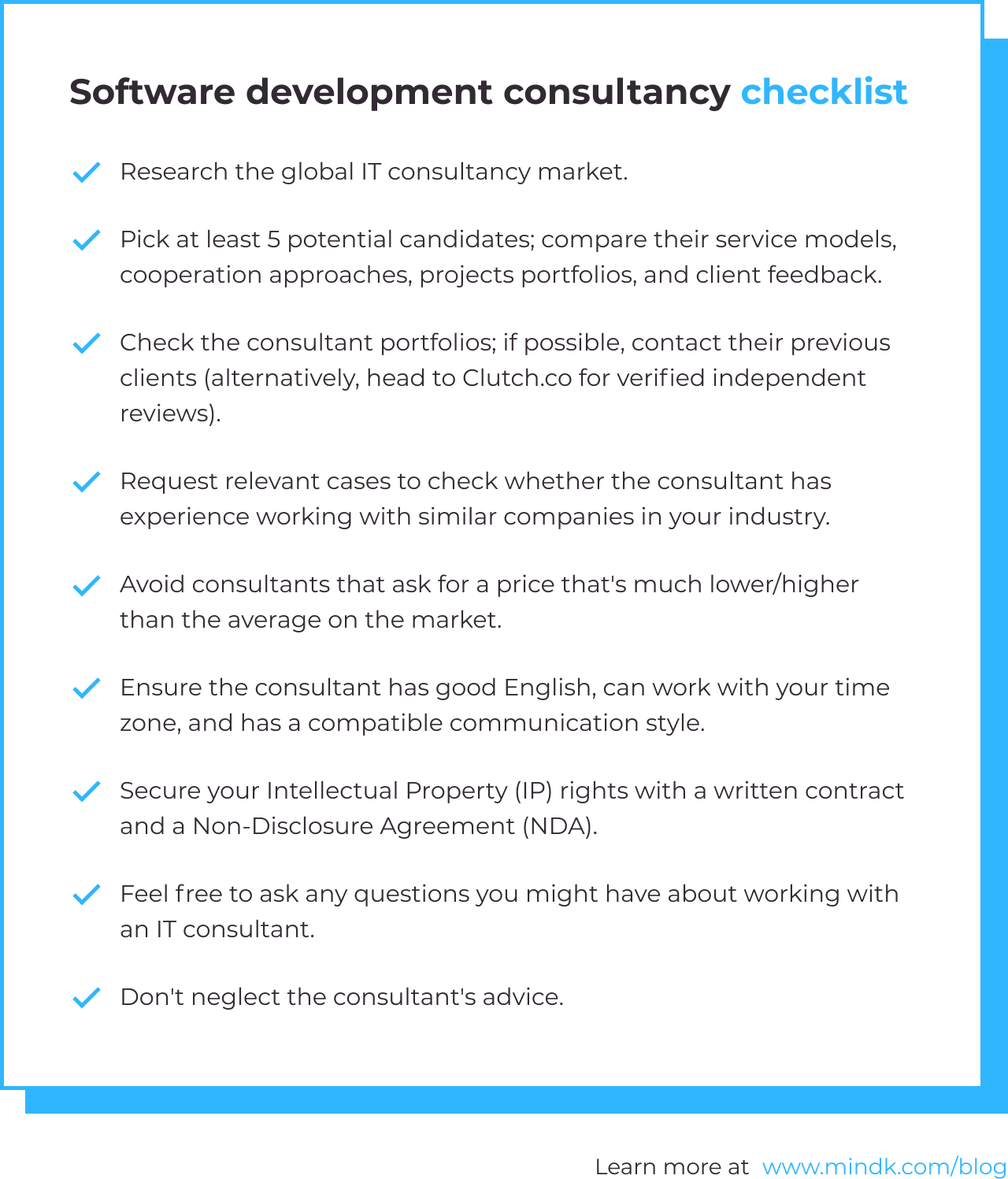Hiring a software consultant can end up being a great asset to your company. But only if you manage to hire a professional that fits your needs and justifies the costs.
In a fast-paced IT landscape, it becomes more and more difficult to keep up with changing technology. Hiring a software consultant can give you access to knowledge your company is lacking internally without having to spend resources on a full-time team member. In the long run, using an IT consulting service can save you both time and money.
But how can you ensure you’ve hired the right consultant?
Let’s find out!
The NOT-To-Do list when hiring a software consultant
#1 NOT enough market research
There are a number of software development consulting firms as well as independent contractors you can utilize to achieve your goals.
However, not all consultants can provide the same level of service.
You want to find an agency that will fulfill your technical needs and also has the drive and dedication to ensure your company succeeds.
So take a look at several companies and see what makes them unique.
Pick at least 5 potential candidates and dive deeper. Compare their service models, cooperation approaches, portfolios of projects, and client feedback.
Choose an engagement model that fits your needs as different companies have different notions of fixed and non-fixed price models. Find out what additional expenses may occur (e.g. hosting) and whether they are covered by the IT consulting company.
Inquire about the consultant’s availability. They could be working on too many projects simultaneously or have no ability to reach your goals within required deadlines.
Skipping the research increases the chance of hiring a consultant who will fail to meet your goals and waste a ton of money in the process.
Another piece of advice is to have a tech-savvy person (or at least some technical knowledge) on your side. Investigate trends and best practices in the software market to make sure that you deal with cutting-edge professionals.
If necessary, request CVs of the development team members or interview them yourself to get the hang of their technical expertise, problem-solving, and soft skills (including English).
Embrace this responsibility and you’ll get a well-designed solution that meets your business needs.
#2 NOT examining the consultant’s track record
A firm that provides software development consulting services should be more than willing to show you a list of previous projects and client feedback. Refusing is a sign that they either don’t have the experience they claim or no customers to recommend them.
Start with the consultant’s website. Head down to the clients section or ask the consultant to share the names of previous clients. It is understandable that some of the information will be private, however, they should be able to show you some feedback or client reviews.
If the consultant has experience in working with your industry, there’s a great chance they already have a good understanding of your problems and can quickly come up with a targeted solution.
Apart from client niches, I’d recommend looking at the number of employees, geographic locations, and organization types to account for any cultural differences and time zones.
The best advice is, of course, to contact their clients yourself. Remember, people are more willing to share their frustrations, so they won’t gloss over any bad situations encountered during the partnership.
By the way, Clutch.co is another great resource for testimonials as it publishes reviews based on an interview they conduct with the client and consultants have no control whatsoever over their rating or what gets mentioned in the review
#3 NOT having them show examples of their work
A software consultant company should be open and willing to provide relevant examples of previous work.
You can often get a pretty good idea about the consultant’s expertise by looking at the work section of their website. MindK, for example, has completed multiple projects in Recruitment/HR, Community Management, Construction & Real Estate, eLearning, Marketing, E-commerce, and other niches.
Alternatively, you can request a list of relevant cases by filling a form on the consultant’s website or contacting their sales department. Some of this information might be protected by an NDA but trustworthy consultants will strive to provide all the evidence you need to judge their competence.
#4 NOT going for value instead of price
From a company standpoint, you want to maximize your profits while minimizing expenses. But there is a reason why the phrase, “you get what you pay for”, exists.
One of our clients was building a complex web system for energy and heat monitoring with IoT features. Instead of hiring an expensive software QA consultant to help with acceptance testing, they burned through at least three full-time employees tasked with finding bugs in their system.
None of them had any experience in software testing, so onboarding a new employee took at least 3 months. They’d spend the next 2-3 months exploring the system as regular users before getting fired.
Subsequently, the company wasted almost two years by choosing the cheapest option on the market.
There are cases when a more expensive option may turn out to be far cheaper in the long run.
#5 NOT making sure you have compatible communication styles
The Internet makes it easier than ever to access top talent across the world. This is irrelevant, however, if you don’t find common ground.
Another of our clients was building an online marketplace for property owners. Their previous outsourced team worked on the project for almost a year until they encountered a problem they couldn’t solve – integration with a payment processing system.
What’s more, new features were constantly breaking old functionality as the team lacked regression testing.
The core problem they had lay in poor communication and the lack of transparency.
Our team had to rework all the processes and invest heavily in regression testing. During a code review, we discovered millions of unnecessary lines of code that only made the system less usable.
In the end, a simple software consultancy turned into a long term partnership that saved our client thousands of dollars and brought us a new project from their associates.
Ask the consultant about their processes and communication style. Make sure they respect your cultural norms, can work with your time zone, and speak English well enough.
It’s equally as important that your software consultant does not use heavy jargon while discussing your project. An effective communicator will be able to articulate their work in a way that is easy to understand.
#6 NOT securing intellectual property rights
It’s important to have a contract to protect your company property. This property could be in the form of:
- Custom code you’ve written.
- Software programs you’ve created.
- Information on how you run your business.
Without this included in your contract, a software consultant can take this information and use it with other clients, or for their own personal gain.
So always request software consultants to sign an NDA (non-disclosure agreement) to ensure that private or sensitive information does not make it outside of your company. This is especially important if your company is giving a software consulting agency access to your IT infrastructure.
#7 NOT taking the project scope serious
A consultant bases their software strategy on the scope you’ve outlined in your contract. When there are changes or expansions to the scope of the project, you should be ready that it can:
- Increase the fees your consultant charges.
- Change the way your consultant manages the implementation of your project.
- Result in a lower quality of work, since they are often working on several projects with strict deadlines and don’t have the bandwidth for an increased workload.
You also run the risk of your consultant no longer having the knowledge to effectively complete these new scope requirements.
#8 NOT having a written contract
A verbal contract is one of the riskiest situations you can put yourself into.
This opens up the possibility of a contractor not fulfilling their end of the agreement, changing the price of IT consulting services, or ignoring the deadlines.
Even if you were to file a lawsuit, a lack of written contract results in a “he said, she said” scenario, which seldomly gets resolved in anyone’s favor.
So it’s necessary to have a paper trail, even if you work with trusted companies that put their reputation at stake each time they start a new project.
Read more: How to make sure your tech partner is worth your trust?
#9 NOT listening to consultant’s advice
This is really obvious, but you’ve hired a software consultant for a reason – to assist with a task your internal team cannot complete on its own. So ask as many questions as you need, but don’t just ignore the consultant’s advice as it negates the reason you hired them in the first place.
Bottom line
Hiring a software consultant does have its share of challenges. Nevertheless, if you overcome these common mistakes and put enough effort into finding a trusted partner, you’ll receive the wealth of knowledge and resources needed to grow your business.
MindK helps companies reach strategic goals and solve digitalization roadblocks.
Our software consultants have over 11 years of experience in business analysis, UI/UX design, web and mobile development, QA/test Automation, IT infrastructure, and DevOps.
So, if you have any issues that prevent your business from going to the next level, feel free to contact us.






